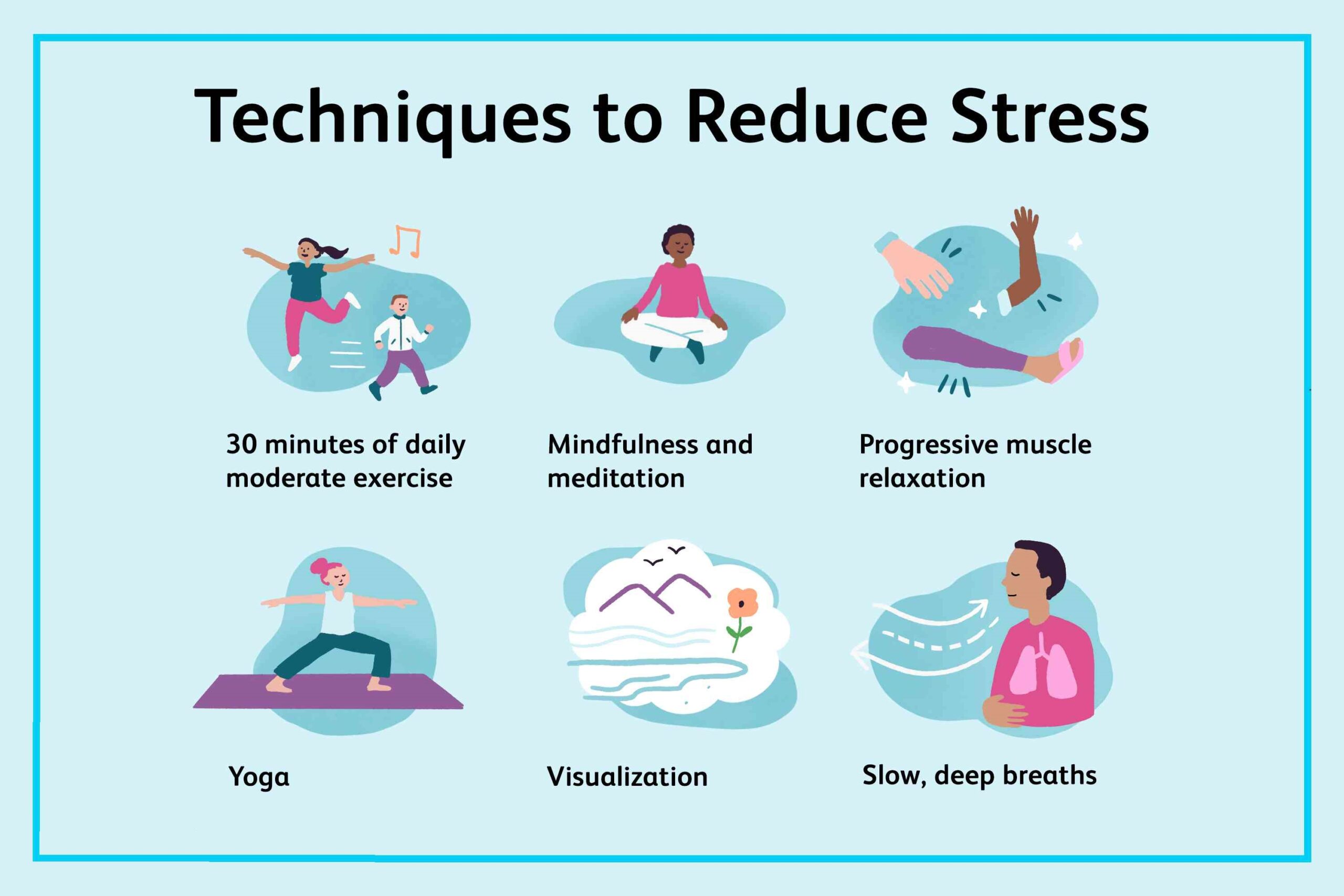What Is Stress?
Stress is your body’s reaction to pressure from a certain situation or event. It can be a physical, mental, or emotional reaction. How to stress Managing stress / stress Management 9 Best tips of Self-care manage Stress. Self Care is an important part of managing stress

We all deal with stress at some point in our lives. Maybe it’s your job, a family illness, or money troubles. These are common triggers. According to a recent study, about half of all Americans say they’re dealing with moderate stress.
Not all stress is bad. It can make you more aware of things around you and keep you more focused. In some cases stress can give you strength and help you get more done.
Stress Symptoms
Chronic stress
- Headache
- Trouble sleeping, or sleeping too much
- Muscle pain or tension
- Digestive issues
- Change in sex drive
- High blood pressure
Emotional effects of chronic stress include:
- Feeling you can’t get things done
- Moodiness
- Anxiety
- Restlessness
- Lack of motivation
- Irritability
- Sadness or depression
Sometimes you may feel like you have too much stress to handle. If you think you just can’t manage it, you may want to seek help from a specialist. Talk to your primary care doctor to see if they can help you determine whether what you’re experiencing is stress or an anxiety disorder.
They can also refer you to a mental health expert and provide you with additional resources and tools.
Signs of stress overload include:
- Panic attacks
- Worrying all the time
- Feeling you’re under constant pressure
- Drinking or doing drugs to deal with your stress
- Overeating
- Smoking
- Depression
- Withdrawal from family and friends
Stress Causes
Stressed is different for everyone. What stresses you out may not even bother your best friend and vice versa. But many causes of stressed can have a negative impact, including:
- Being bullied
- Working too hard
- Losing a job
- Marriage or relationship problems
- Recent break up or divorce
- Death in the family
- Difficulty in school
- Family problems
- Busy schedule
- Recent move
Still, our bodies react the same to stressors. That’s because the response is your body’s way of dealing with tough or demanding situations. It causes hormonal, respiratory, cardiovascular, and nervous system changes. For example, stress can make your heart beat faster, make you breathe rapidly, sweat, and tense up. It can also give you a burst of energy.
This is known as the body’s “fight-or-flight response.” It’s this chemical reaction that prepares your body for a physical reaction because it thinks it’s under attack. This type of stress helped our human ancestors survive in nature.
Manage Stress
How stress management These days it’s hard not to get overwhelmed once in a while. Between juggling work, family, and other commitments, you can become too stressed out and busy. But you need to set time aside to unwind or your mental and physical health can suffer.

Learning how to manage your stress takes practice, but you can — and need to — do it. Here are 10 ways to make it easier.
In the meantime, there are things you can learn to help you manage stress before it gets to be too much. These tips may help you keep stress at bay:
- Keep a positive attitude.
- Accept that there are events that you cannot control.
- Be assertive instead of aggressive. Assert your feelings, opinions, or beliefs instead of becoming angry, defensive, or passive.
-
Learn to manage your time more effectively.
- Set limits appropriately and say no to requests that would create excessive stress in your life.
- Make time for hobbies and interests.
- Don’t rely on alcohol, drugs, or compulsive behaviors to reduce stress. Drugs and alcohol can stressed your body even more.
- Seek out social support. Spend enough time with those you love.
- Seek treatment with a psychologist or other mental health professional trained in stress management or biofeedback techniques to learn more healthy ways of dealing with the stress in your life.
1.Exercise
Working out regularly is one of the best ways to relax your body and mind. Plus, exercise will improve your mood. But you have to do it often for it to pay off.
So how much should you exercise every week?
Work up to 2 hours and 30 minutes of moderately intense exercise like brisk walks or 75 minutes of a more vigorous exercise like swimming laps, jogging or other sports.
Focus on setting fitness goals you can meet so you don’t give up. Most of all remember that doing any exercise is better than none at all.

Also Read :Golden Temple Sri Harmandir Sahib, Amritsar, India
2.Relax Your Muscles
When you’re stressed, your muscles get tense. You can help loosen them up on your own and refresh your body by:
- Stretching
- Enjoying a massage
- Taking a hot bath or shower
- Getting a good night’s sleep
3.Deep Breathing
Stopping and taking a few deep breaths can take the pressure off you right away. You’ll be surprised how much better you feel once you get good at it. Just follow these 5 steps:
- Sit in a comfortable position with your hands in your lap and your feet on the floor. Or you can lie down.
- Close your eyes.
- Imagine yourself in a relaxing place. It can be on the beach, in a beautiful field of grass, or anywhere that gives you a peaceful feeling.
- Slowly take deep breaths in and out.
- Do this for 5 to 10 minutes at a time.

4.Take a Break
You need to plan on some real downtime to give your mind time off. If you’re a person who likes to set goals, this may be hard for you at first. But stick with it and you’ll look forward to these moments. How to stress management Restful things you can do include:
- Meditation
- Yoga
- Tai chi
- Prayer
- Listening to your favorite music
- Spending time in nature
5.Make Time for Hobbies
You need to set aside time for things you enjoy. how to stress management Try to do something every day that makes you feel good, and it will help relieve your managing stress. It doesn’t have to be a ton of time — even 15 to 20 minutes will do. Relaxing hobbies include things like:
- Reading
- Knitting
- Doing an art project
- Playing golf
- Watching a movie
- Doing puzzles
- Playing cards and board games
6.Talk About Your Problems
If things are bothering you, talking about them can help lower your managing stress. You can talk to family members, friends, a trusted clergyman, your doctor, or a therapist.
And you can also talk to yourself. It’s called self-talk and we all do it. But in order for self-talk to help reduce it you need to make sure it’s positive and not negative.
So listen closely to what you’re thinking or saying when you’re stressed out. If you’re giving yourself a negative message, change it to a positive one. For example, don’t tell yourself “I can’t do this.” Tell yourself instead: “I can do this,” or “I’m doing the best I can.”
Also read :101+ motivation Quotes in Hindi Motivate You

7.Go Easy On Yourself
Accept that you can’t do things perfectly no matter how hard you try. You also can’t control everything in your life. So do yourself a favor and stop thinking you can do so much. And don’t forget to keep up your sense of humor. Laughter goes a long way towards making you feel relaxed.
8.Eliminate Your Triggers
Figure out what are the biggest causes of stressed in your life. Is it your job, your commute, your schoolwork? If you’re able to identify what they are, see if you’re able to eliminate them from your life, or at least reduce them.
If you can’t identify the main causes of your managing stress, try keeping a journal. Make note of when you become most anxious and see if you can determine a pattern, then find ways to remove or lessen those triggers.
9.Eat Well
Eating a regular, well-balanced diet will help you feel better in general. It may also help control your moods. Your meals should be full of vegetables, fruit, whole grains, and lean protein for energy. And don’t skip any. It’s not good for you and can put you in a bad mood, which can actually increase your managing stress. this is the best way how to manage stress management






